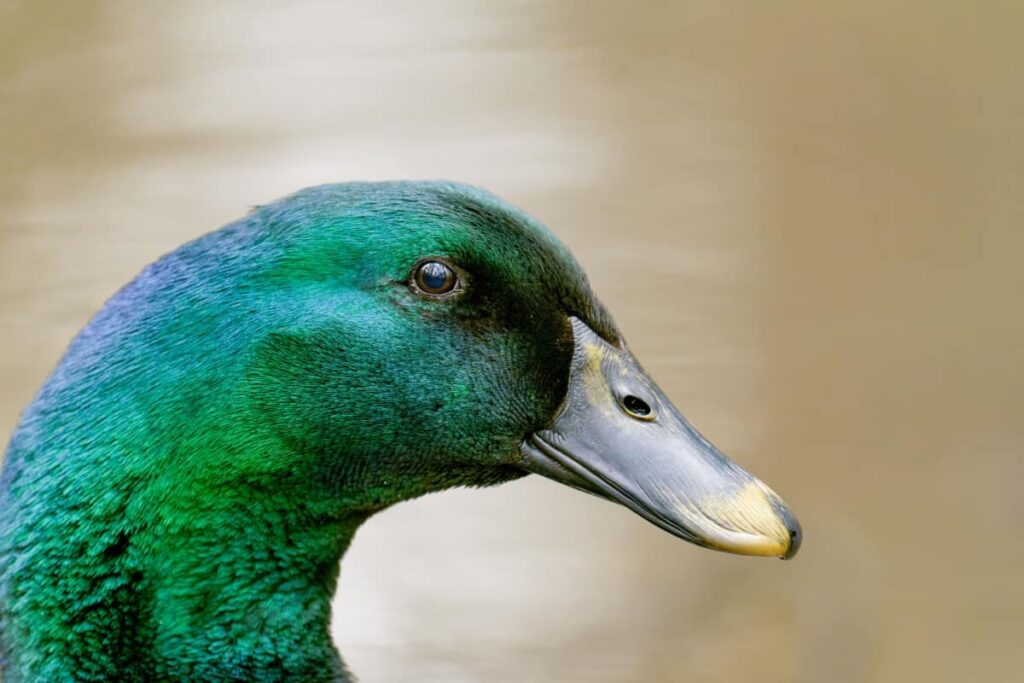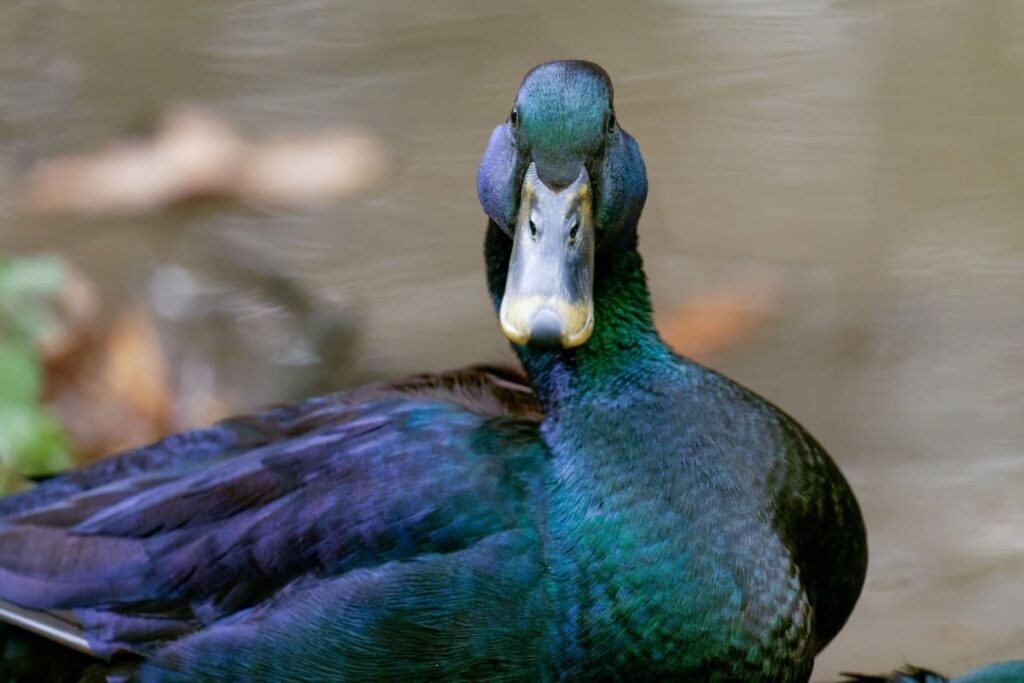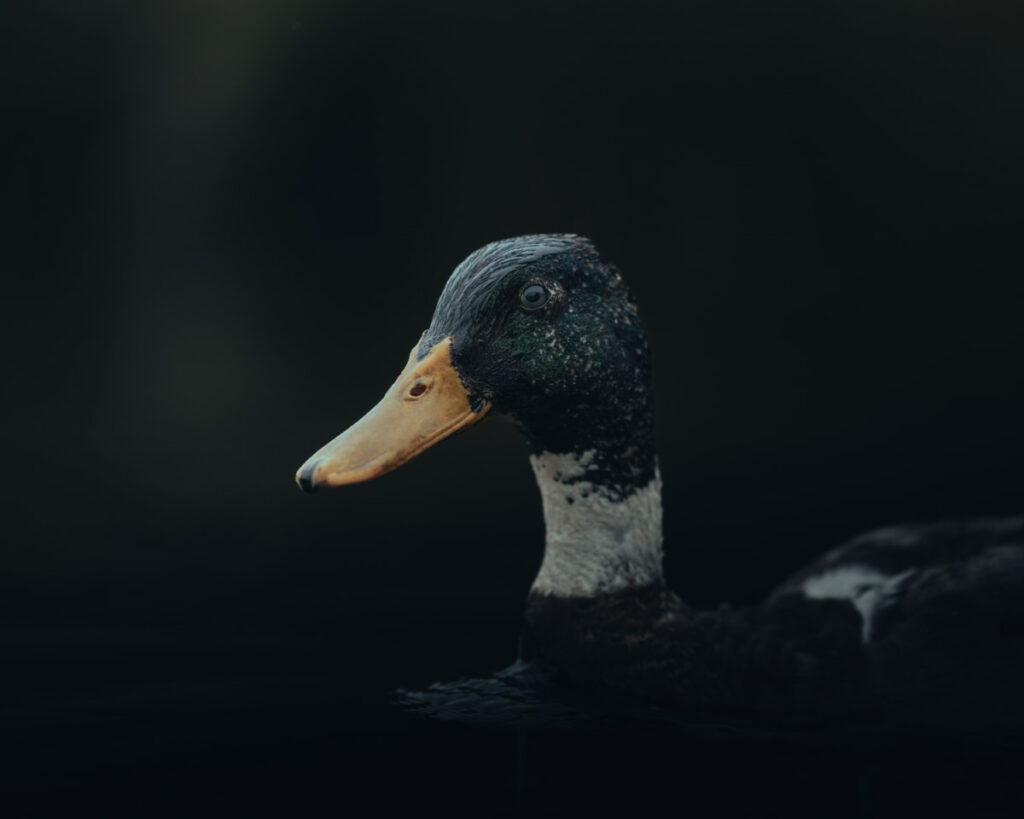Raising Pomeranian Ducks can bring numerous benefits to farmers and homesteaders alike. The main reason why raising Pomeranian Ducks is important is their dual-purpose nature. Not only do they provide a steady supply of eggs, but they also yield delicious meat. This makes them an ideal choice for individuals looking to be more self-sufficient or those who appreciate farm-to-table practices.

Pomeranian Duck Profile
| Breed Name | Pomeranian Ducks |
| Other Name | Pommern and Pommernente in German |
| Breed Purpose | Dual Purpose |
| Varieties | Black & Blue |
| Breed Class | Medium |
| Broodiness | Average |
| Special Notes | Excellent Foragers |
| Weight | Drake (Pomeranian Duck male) – 3kg, Hens (Pomeranian Duck Female) – 2.5 kg |
| Climate Tolerance | All Climates |
| Egg Color | White/Greenis |
| Egg Size | Large |
| Egg Weight | 80-90 grams |
| Flying Ability | Poor |
| Rarity | Rare |
| Country of Origin | German |
Origin and History
The Pomeranian or Pommern duck, also known as the Pommernente in German, is a fascinating breed of domesticated duck. This landrace breed hails from the beautiful coastal region called Pomerania, which is situated along the Baltic Sea coast in Germany. The historical significance of Pomeranian ducks adds depth to their appeal. They have been cherished and raised for generations by farmers who appreciate their unique qualities and characteristics.
Characteristics
The Pomeranian duck is known for its distinct and charming characteristics. With its distinct features and charming heritage, the Pomeranian duck has captured hearts far beyond its place of origin. People all around are discovering the joy that comes with raising this special breed.
The advantage of raising Pomeranian Ducks is their relatively low maintenance requirements. These ducks are hardy and adaptable, requiring minimal intervention from farmers once provided with proper housing and access to water. These friendly creatures thrive when they have companionship from other ducks or even other poultry species.
Size
The Pomeranian duck, with its adorable appearance and medium size, is truly a sight to behold. The males of this breed typically weigh around 3 kg, while the females usually weigh 2.5 kg. When it comes to caring for these delightful creatures, providing them with proper nutrition and a clean living environment is essential. They are relatively easy to maintain and make great additions to backyard flocks or small farms.
Egg Productivity
In terms of egg productivity, Pomeranian ducks are not the most prolific layers, but they do produce about 70 to 100 eggs per year. These eggs are usually white or greenish and weigh approximately 80-90 grams each. While they may not lay as many eggs as some other breeds, the quality of their eggs is highly regarded. Pomeranian ducks also have certain traits that make them stand out from other breeds.
In case you missed it: Duck Farming Basics, Housing, Feeding for Eggs, Meat

They possess excellent foraging abilities, making them self-sufficient when it comes to finding food in various environments. This makes them well-suited for free-ranging setups or backyard farming. Their consistent egg-laying capabilities make them an excellent choice for those who want a reliable source of fresh eggs throughout the year. Plus, with their charming personality, raising Pomeranian ducks can be a rewarding experience overall.
Lifespan
Lifespan is an important factor to consider when raising any animal. The Pomeranian duck, with proper care and maintenance, can live for an average of 8 to 10 years. This lifespan of Pomeranian ducks may vary depending on various factors such as genetics, diet, and overall health. To ensure a long and healthy life for your Pomeranian ducks, it is crucial to provide them with a good diet that meets their nutritional needs. A mix of grains, vegetables, and high-quality poultry feed will help keep them strong and thriving.
Uses and Purpose
The Pomeranian duck is not only a beautiful and elegant bird but also serves practical purposes on the farm. The main use is for egg production. Apart from their excellent egg-laying abilities, Pomeranian ducks are also raised for meat production. Their medium-sized bodies make them ideal for culinary purposes. Raising Pomeranian ducks can be a rewarding experience as they offer both nutritious eggs and delicious meat. Plus, having your flock allows you to have control over the quality of your food supply while fostering self-sustainability.
Price Range
The cost of a Pomeranian duck can change based on various factors such as breed, age, and location. On average, pay anywhere from $50 to $200 for a Pomeranian Duck. Before making a decision based on price, remember to do thorough research on reputable sellers or breeders who prioritize the health of their ducks. A lower-priced duck doesn’t necessarily mean it is of lesser quality or health condition; however, it is crucial to ensure that you are supporting ethical breeding practices.
In case you missed it: Bronze Turkey Breed: Profile, Characteristics, Origin, Size, Uses, Price, Breeding, and Lifespan

Care and Maintenance
Regular health check-ups are important in maintaining the health of your ducks. Vaccinations and preventive treatments can help protect them from common diseases and parasites that could potentially shorten their lifespan. Pomeranian duck breeding is an interesting and rewarding endeavor for those who are passionate about raising poultry.
The process of breeding Pomeranian ducks involves selecting healthy and genetically diverse individuals to ensure the production of strong offspring. Proper housing is another key aspect in ensuring the longevity of your Pomeranian ducks. Providing ducks with a clean and comfortable environment that protects them from harsh weather conditions will contribute to their overall well-being.
Additionally, regular exercise should be encouraged to promote physical fitness and mental stimulation. Allowing the ducks access to open spaces or providing them with appropriate toys or activities within their enclosure will keep them active and happy. Feeding the Pomeranian ducks with a balanced diet is crucial for their health. Their diet consists of commercial duck feed supplemented with fresh greens, fruits, vegetables, and insects they find while foraging. Access to freshwater for drinking and bathing is also necessary.
Regular veterinary check-ups include vaccinations against common diseases and treatments for parasites if necessary. Pomeranian ducks are generally hardy birds but may require extra protection during extreme weather conditions such as harsh winters or excessive heat. Providing shelter or adjusting their environment accordingly will help them stay comfortable.
Frequently Asked Questions (FAQ) on Pomeranian Ducks
Are Pomeranian Ducks Suitable for Beginners?
Absolutely. Pomeranian Ducks are known for being docile and friendly, which makes them a great choice for novice duck keepers. They have a calm temperament and adapt well to different environments, making it easier to provide the care they need.
Do Pomeranian Ducks Require Special Housing?
While all ducks need adequate shelter, Pomeranians thrive in both indoor and outdoor environments. A secure coop or duck house with access to fresh water is essential, as well as protection from predators and extreme weather conditions.
What do Pomeranian Ducks Eat?
Like other ducks, Pomeranians enjoy a varied diet that includes high-quality commercial poultry feed supplemented with fresh fruits, vegetables, grains, and insects if available.
Can I Keep Pomeranian Ducks Indoors?
While it’s possible to raise Pomeranian ducks indoors during their early stages or temporarily in colder climates, they require access to outdoor areas for exercise and natural behaviors like foraging.
Do I Need a Pond for My Pomeranians?
While having access to water is crucial for bathing purposes as well as keeping their eyes healthy, a small pool or shallow container will suffice instead of a full-fledged pond if necessary.
In case you missed it: Narragansett Turkey Breed: Profile, Characteristics, Origin, Size, Uses, Price, Breeding, and Lifespan

Conclusion
Pomeranian Ducks are known for their excellent foraging abilities, making them well-suited for free-range environments. They can thrive in various climates, which adds to their versatility as a breed. With proper care for their unique needs, these charming little creatures will bring happiness into your life. Pomeranian Ducks are hardy and adaptable creatures. They can thrive in various climates, making them an ideal choice for different geographical locations.
- How to Raise Pigs in Your Own Backyard: A Comprehensive Guide
- Budget Friendly Sheep Shed Ideas: Cheap and Low-Cost Tips
- How Much Do Cattle Farmers Make: Revenue Streams in Cattle Farming
- Management Pests and Diseases in Your Cotton Field
- Sheep Farming Business Plan for Beginners
- Aquaponic Farming at Home: A Step-By-Step Guide
- Profitable Village Farming Business Ideas in 2024
- High-Yield Aquaculture: Fast-Growing Fish for Farming
- Effective Fish Pond Construction Techniques for Beginners
